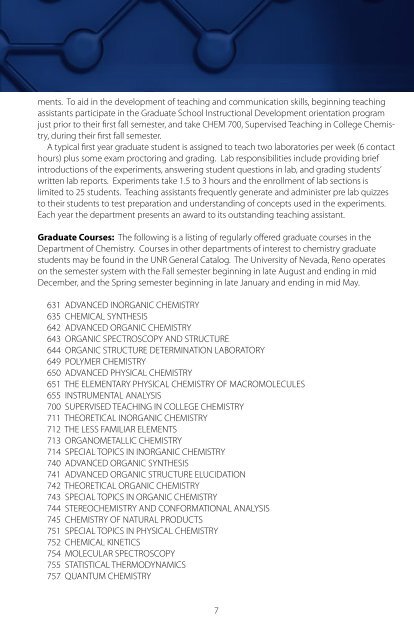Chemistry and Chemical Physics Graduate Programs brochure
Chemistry and Chemical Physics Graduate Programs brochure
Chemistry and Chemical Physics Graduate Programs brochure
You also want an ePaper? Increase the reach of your titles
YUMPU automatically turns print PDFs into web optimized ePapers that Google loves.
ments. To aid in the development of teaching <strong>and</strong> communication skills, beginning teaching<br />
assistants participate in the <strong>Graduate</strong> School Instructional Development orientation program<br />
just prior to their first fall semester, <strong>and</strong> take CHEM 700, Supervised Teaching in College <strong>Chemistry</strong>,<br />
during their first fall semester.<br />
A typical first year graduate student is assigned to teach two laboratories per week (6 contact<br />
hours) plus some exam proctoring <strong>and</strong> grading. Lab responsibilities include providing brief<br />
introductions of the experiments, answering student questions in lab, <strong>and</strong> grading students’<br />
written lab reports. Experiments take 1.5 to 3 hours <strong>and</strong> the enrollment of lab sections is<br />
limited to 25 students. Teaching assistants frequently generate <strong>and</strong> administer pre lab quizzes<br />
to their students to test preparation <strong>and</strong> underst<strong>and</strong>ing of concepts used in the experiments.<br />
Each year the department presents an award to its outst<strong>and</strong>ing teaching assistant.<br />
<strong>Graduate</strong> Courses: The following is a listing of regularly offered graduate courses in the<br />
Department of <strong>Chemistry</strong>. Courses in other departments of interest to chemistry graduate<br />
students may be found in the UNR General Catalog. The University of Nevada, Reno operates<br />
on the semester system with the Fall semester beginning in late August <strong>and</strong> ending in mid<br />
December, <strong>and</strong> the Spring semester beginning in late January <strong>and</strong> ending in mid May.<br />
631 ADVANCED INORGANIC CHEMISTRY<br />
635 CHEMICAL SYNTHESIS<br />
642 ADVANCED ORGANIC CHEMISTRY<br />
643 ORGANIC SPECTROSCOPY AND STRUCTURE<br />
644 ORGANIC STRUCTURE DETERMINATION LABORATORY<br />
649 POLYMER CHEMISTRY<br />
650 ADVANCED PHYSICAL CHEMISTRY<br />
651 THE ELEMENTARY PHYSICAL CHEMISTRY OF MACROMOLECULES<br />
655 INSTRUMENTAL ANALYSIS<br />
700 SUPERVISED TEACHING IN COLLEGE CHEMISTRY<br />
711 THEORETICAL INORGANIC CHEMISTRY<br />
712 THE LESS FAMILIAR ELEMENTS<br />
713 ORGANOMETALLIC CHEMISTRY<br />
714 SPECIAL TOPICS IN INORGANIC CHEMISTRY<br />
740 ADVANCED ORGANIC SYNTHESIS<br />
741 ADVANCED ORGANIC STRUCTURE ELUCIDATION<br />
742 THEORETICAL ORGANIC CHEMISTRY<br />
743 SPECIAL TOPICS IN ORGANIC CHEMISTRY<br />
744 STEREOCHEMISTRY AND CONFORMATIONAL ANALYSIS<br />
745 CHEMISTRY OF NATURAL PRODUCTS<br />
751 SPECIAL TOPICS IN PHYSICAL CHEMISTRY<br />
752 CHEMICAL KINETICS<br />
754 MOLECULAR SPECTROSCOPY<br />
755 STATISTICAL THERMODYNAMICS<br />
757 QUANTUM CHEMISTRY<br />
7


